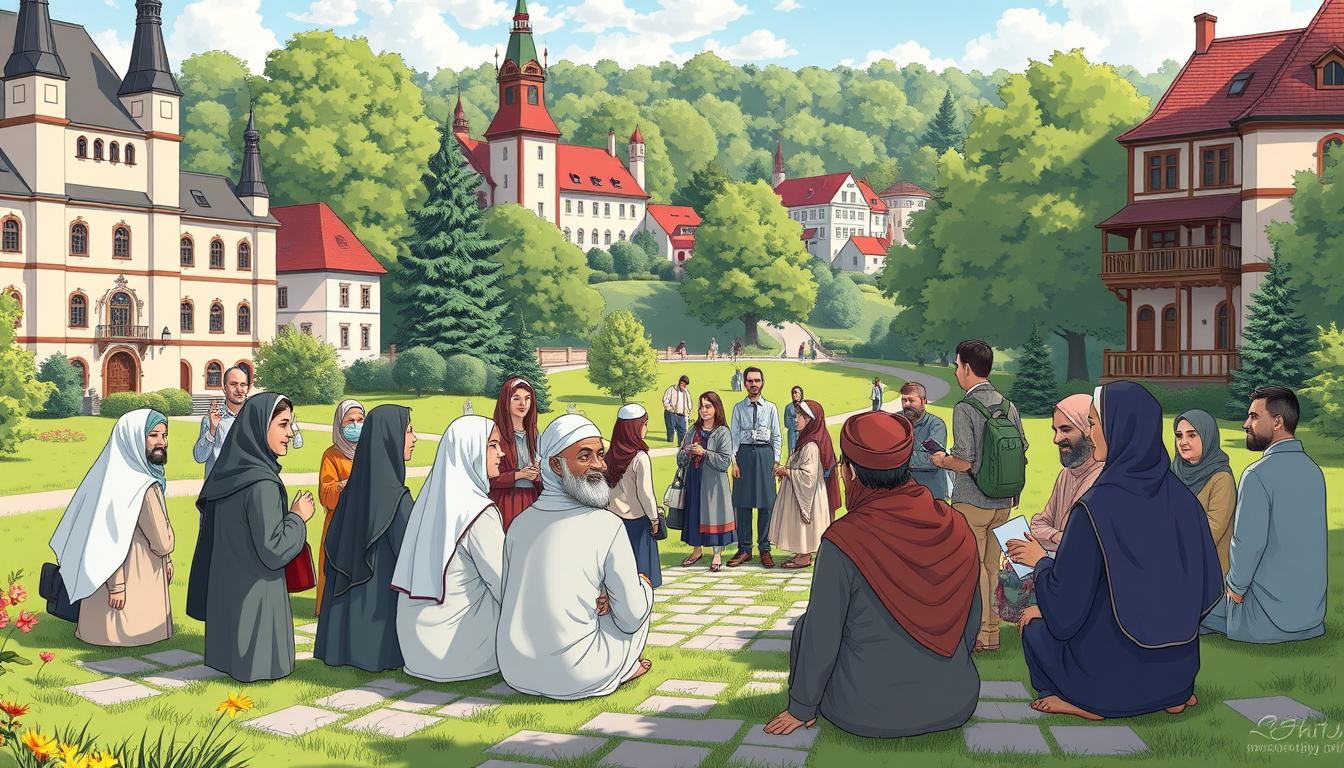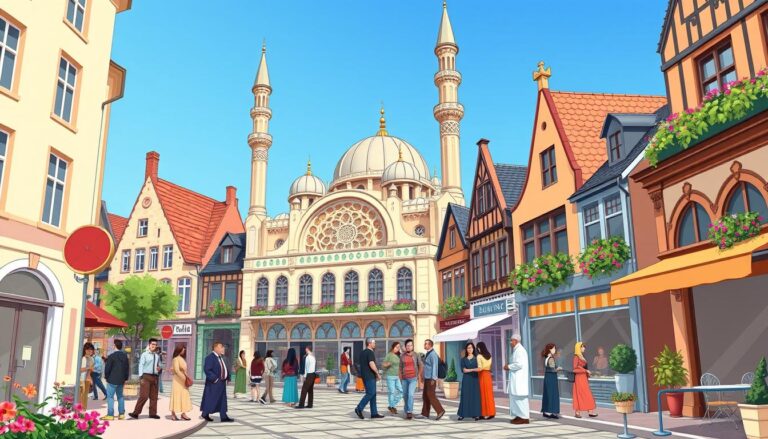Islam in the Czech Republic
Contrary to popular perception, the Muslim community in the Czech Republic accounts for less than 1% of the total population. According to the Pew Research Center, there are an estimated 20,000 Muslims in the country, representing a mere 0.2% of the Czech population. Despite this small demographic, the growing Turkish community has emerged as the largest Muslim group in the Czech Republic.
The history of Islam’s presence in the region dates back to the 10th century, when Íbrahím ibn Jaqúb, a Jewish convert to Islam from Spain, made the first documented visit to the area. Islam was officially recognized as a state religion in the Czech lands in 1912 during the Austro-Hungarian rule, and the first Muslim community was established in 1934. However, the influence of Islam on Czech culture has traditionally been minimal.
Key Takeaways
- The Muslim population in the Czech Republic is less than 1% of the total population.
- The largest Muslim group in the country is the growing Turkish community.
- Islam has a long history in the region, with the first documented visit in the 10th century.
- Despite its small presence, the Muslim community in the Czech Republic faces challenges related to integration and acceptance in society.
- The Czech Republic has seen an increase in anti-Islam sentiment in recent years, leading to hate speech and physical attacks against Muslims.
Introduction to Islam in the Czech Republic
The presence of Islam in the Czech Republic, formerly known as Czechoslovakia, dates back centuries. While the Muslim population in the country remains relatively small, accounting for less than 1% of the total population, it has a rich historical narrative and continues to make important contributions to the cultural fabric of the nation.
Brief Overview of the Muslim Population in the Czech Republic
According to the Pew Research Center, the Muslim population in the Czech Republic is estimated to be around 20,000 people, or less than 1% of the total population. The largest Muslim group in the country is the growing Turkish community, which has established a significant presence in the Czech Republic.
Historical Background of Islam’s Presence in the Region
The first documented visit of a person with knowledge of Islam to the Czech lands was made in 964-965 by Íbrahím ibn Jaqúb, a Jewish convert to Islam from then-Muslim Spain. During the 19th century, strong trade links between Austria-Hungary and the Ottoman Empire led to individual Muslims settling in the Czech lands. In 1912, Islam was officially recognized as a “state religion” by the Austro-Hungarian monarchy, and the first Muslim community was established in the region in 1934.
“The presence of Islam in the Czech Republic, formerly known as Czechoslovakia, dates back centuries.”
Demographics of Muslims in the Czech Republic
The Muslim population in the Czech Republic is relatively small, comprising around 0.13% of the total population. According to the latest census data, there are approximately 10,000 Muslims residing in the country, a modest increase from the 3,500 recorded in the 2010 census. The largest segment of the Muslim community in the Czech Republic is of Turkish origin, with significant groups also coming from Bosnia-Herzegovina, Kosovo, and the Caucasus region.
Additionally, a sizable and influential part of the Muslim population are middle-class individuals of Egyptian, Syrian, and other Middle Eastern ancestries, many of whom studied in Czechoslovakia during the communist era and opted to stay. There are also a few hundred Muslim converts among the Czech population, further contributing to the diversity of the Muslim community in the country.
Geographic Distribution
The geographic distribution of Muslims in the Czech Republic is concentrated primarily in the larger urban centers, with the majority residing in the capital city of Prague. Other notable Muslim populations can be found in the cities of Brno, Ostrava, and Plzeň. The Turkish Muslim community, in particular, is known to have a significant presence in Prague, where they have established several mosques and cultural centers.
While the overall Muslim population in the Czech Republic remains relatively small, their presence and influence continue to grow, particularly in the major metropolitan areas of the country. The demographic trends and geographic distribution of the Muslim community in the Czech Republic provide valuable insights into the evolving religious landscape of the nation.
Islam in the Czech Republic: Key Facts and Figures
The Muslim community in the Czech Republic, though relatively small, has a unique presence in the country. Islam is officially recognized as a religion in the Czech Republic, but its followers face certain restrictions compared to other faiths. They are unable to establish their own schools, hold legally recognized weddings, or conduct religious ceremonies in public spaces.
The number of Muslims in the country is estimated to be between 5,000 and 20,000, representing less than 0.2% of the total population. While the Muslim community in the Czech Republic tends to keep a low profile, there have been isolated controversies over issues like the use of the hijab in schools.
The religious landscape in the Czech Republic has undergone significant changes in recent decades. According to the 2021 census, no religion was the most common affiliation, with 47.8% of the population identifying as such. Catholicism, once the dominant faith, has declined from 39.1% in 1991 to just 9.3% in 2021. Other Christian denominations have also seen a decline, while the percentage of believers without a specific religion has increased from 0.3% in 1991 to 9.6% in 2021.
The Muslim population in the Czech Republic is diverse, with the main ethnic groups being Arabs, Afghans, sub-Saharan Africans, Pakistanis, refugees from Bosnia-Herzegovina, and individuals from Central Asian and Caucasian former Soviet Union republics. Interestingly, around 80% of the Muslim converts in the country are female.
The mainstream Muslim organizations in the Czech Republic, such as the Ústøedí muslimských obcí (Main Office of Muslim Associations), have sought to maintain a low profile and have generally condemned terrorism and extremism. However, there are also smaller, less influential organizations that have expressed concerns about potential hate against Muslims in the country.
Despite the small size of the Muslim community, the topic of Islam in the Czech Republic has sparked debates and occasional controversies. The country’s religious landscape continues to evolve, and the integration and acceptance of the Muslim population remain important issues to be addressed.
Mosques and Islamic Centers in Czech Cities
The Muslim community in the Czech Republic has a limited but growing presence, with a few notable mosques and Islamic centers serving as hubs for religious and cultural activities. These facilities play a crucial role in supporting the spiritual and social needs of the country’s estimated 20,000 Muslims, who make up just 0.2% of the total population.
Notable Mosques in Prague, Brno, and Other Cities
The first mosque in the Czech Republic was opened in Brno in 1998, followed by the establishment of a mosque in Prague the following year. These two mosques, along with a third in Karlovy Vary, serve as important gathering places for the Muslim community. The Islamic Center in Prague includes prayer areas for both men and women, as well as restrooms, a library, and an office.
The Prague mosque is open daily, with extended hours during the summer season. The center can be reached at the contact number +420 224 227 903. While attempts have been made to open additional mosques in other Czech cities, such efforts have often faced resistance from local residents.
Facilities and Services Offered by Islamic Centers
- Prayer areas for men and women
- Restrooms for both genders
- Libraries and educational resources
- Offices for administration and community outreach
These Islamic centers serve as hubs for the Muslim community, providing not only religious services but also educational programs, social activities, and opportunities for cultural exchange. As the Muslim population in the Czech Republic continues to grow, the role of these facilities in fostering understanding and integration within Czech society will become increasingly important.
“The Islamic Center in Prague plays a vital role in supporting the spiritual and social needs of the country’s Muslim community.”
Challenges Faced by Muslims in the Czech Republic
The integration of Muslims in Czech society has faced significant challenges in recent years. With a growing anti-Islam sentiment in the country, members of the Muslim community have increasingly become targets of hate speech and even physical attacks, despite many having lived in the Czech Republic long before the European refugee crisis.
Integration and Acceptance in Czech Society
Muslims in the Czech Republic often struggle to find venues to gather for religious celebrations, as large halls frequently refuse to host them. This limited access to public spaces for religious observances poses a significant obstacle to the community’s ability to practice their faith freely.
Legal and Religious Rights for Muslims
While Islam is officially recognized in the Czech Republic, the legal rights of Muslims are restricted compared to other faiths. They are denied several basic privileges, such as the right to establish schools, hold legally recognized weddings, and conduct religious ceremonies in public spaces – rights that are enjoyed by members of other recognized religious groups.
According to the 2011 census, only 3% of the Czech population adheres to various religious beliefs, including Islam, while over a third (35%) holds no religious beliefs at all. The Muslim community in the Czech Republic is estimated to be between 5,000 and 20,000 individuals, which is less than 0.02 percent of the total population.
“HateFree, an anti-discrimination organization, has debunked around 100 anti-Muslim hoax stories in the Czech Republic over the past few years, indicating a persistent issue with misinformation.”
The challenges faced by Muslims in the Czech Republic highlight the need for greater integration, acceptance, and protection of their religious freedoms in order to ensure a more inclusive and diverse society.
Islam in the Czech Republic: Political Discourse
Islam has become a divisive political issue in the Czech Republic, with the rise of far-right parties like the Freedom and Direct Democracy Party (SPD) exploiting anti-Islam sentiment to gain a foothold in the country’s politics. The SPD’s leader, Tomio Okamura, has built ties with other far-right movements across Europe and has made the elimination of Islam’s presence in the Czech Republic a key part of his party’s agenda.
This anti-Islam rhetoric has contributed to a growing sense of Islamophobia in the country, with some members of the Muslim community reporting that friends and family have already left the Czech Republic due to the hostile environment. According to a Eurobarometer survey conducted in May 2016, only 21 percent of Czechs agreed that their country should help refugees, compared to the 63 percent EU average.
Impact on the Muslim Community
The Czech Republic’s Muslim community, estimated to be between 5,000 and 20,000 members, or less than 0.02% of the total population, has faced significant challenges due to the political discourse surrounding Islam. The community has limited legal and religious rights, with restrictions on establishing schools, holding legally recognized weddings, and conducting religious ceremonies in public spaces.
Furthermore, the anti-Islam sentiment has led to an increase in hate speech and physical attacks against Muslims living in the country. A Harvard University survey found that Czechs exhibit a higher level of implicit racial bias than any other European country, reflecting the deep-seated prejudices that the Muslim community faces.
“The Muslim community in the Czech Republic is estimated to be between 5,000 and 20,000 members, which is less than 0.02% of the total population.”
The political discourse surrounding Islam in the Czech Republic has had a significant impact on the Muslim community, contributing to a hostile environment and limiting their legal and religious rights. As the far-right continues to gain traction, it remains to be seen how the situation will evolve and what the long-term consequences will be for the country’s Muslim minority.
Cultural Contributions of Muslims in the Czech Republic
Despite the relatively small size of the Muslim community in the Czech Republic, its members have made significant contributions to the country’s culture and society. Many Czech Muslims are professionals, such as doctors, engineers, and IT specialists, who have helped drive economic development and progress.
The Muslim community has also been actively involved in various cultural and social initiatives, enriching the tapestry of Czech culture. From participating in interfaith dialogues to organizing community events, Czech Muslims have played a role in fostering understanding and integration within the broader society.
While the influence of the Muslim community on the overall Czech culture may have been limited due to its small population size, their presence has nonetheless added diversity and vibrancy to the nation’s cultural landscape. As the Muslim population in the Czech Republic continues to evolve, their cultural contributions are poised to become more prominent and recognized.
“The Muslim community in the Czech Republic has consistently demonstrated its commitment to being a productive and engaged part of Czech society. Their professional achievements and cultural initiatives have undoubtedly left a lasting impact.”
Looking ahead, the continued integration and acceptance of Muslims within the Czech Republic will be crucial in unlocking the full potential of their cultural contributions. By embracing diversity and fostering open dialogue, the Czech Republic can further strengthen its position as a nation that celebrates the rich tapestry of its multicultural heritage.
Future Prospects for Islam in the Czech Republic
The future of Islam in the Czech Republic remains uncertain as the country’s political landscape becomes increasingly dominated by anti-Islam rhetoric and policies. While the Muslim population is projected to remain small, likely below 1% of the total population, the level of integration and acceptance within Czech society will be crucial.
Projections for Growth and Integration
Europe’s Muslim population is expected to grow significantly in the coming decades, with estimates of over 58 million by 2030. However, the Czech Republic has been relatively isolated from this trend, having accepted very few refugees and with the Muslim community making up only around 0.1% of the total population.
Despite the small size of the Muslim community, initiatives to foster greater understanding and coexistence will be important in shaping the path forward. The Czech Republic’s political leadership, marked by President Zeman’s controversial anti-immigrant and anti-Muslim statements, has contributed to a climate of hostility towards the Muslim population.
Initiatives for Fostering Understanding and Coexistence
- Interfaith dialogues and community events to promote mutual understanding between the Muslim community and the broader Czech population.
- Educational programs and public awareness campaigns to counter misinformation and negative stereotypes about Islam and Muslims.
- Collaboration between local authorities, civil society organizations, and religious leaders to address the needs and concerns of the Muslim community.
As the Czech Republic navigates the future of Islam within its borders, a focus on inclusivity, respect, and open dialogue will be essential in fostering a society of coexistence and understanding.
“The future of Islam in the Czech Republic will be shaped by the country’s ability to foster a climate of tolerance and understanding, rather than one dominated by fear and division.”
Conclusion
The Muslim community in the Czech Republic is small, comprising less than 1% of the total population. While Islam has a long history in the region, its influence on Czech culture has traditionally been limited. In recent years, however, the growing anti-Islam sentiment in Czech politics and society has posed significant challenges for the Muslim minority, who face integration issues and restrictions on their religious rights.
As the country’s religious landscape continues to evolve, with only 10% of the population identifying as Roman Catholic and 48% holding no religious beliefs, the future prospects for Islam in the Czech Republic remain uncertain. The need for greater understanding and coexistence between the Muslim community and the broader population is evident, as the country grapples with the complexities of its religious diversity and the ongoing debate surrounding the role of Islam in Czech society.
The summary of Islam in the Czech Republic highlights the nuanced and complex nature of the religious dynamics within the country. While the Muslim population remains small, the challenges they face, from integration to political rhetoric, underscore the importance of fostering an environment of mutual respect and inclusion. As the Czech Republic continues to navigate its religious landscape, the path forward will require open dialogue, education, and a commitment to ensuring the rights and freedoms of all its citizens, regardless of their faith or beliefs.
Source Links
- Islam in the Czech Republic
- Czech Republic’s tiny Muslim community subject to hate
- Islamophobia in the Czech Republic and Europe | Institute of International Relations Prague – Expertise to impact
- Czech Republic – United States Department of State
- National Profiles | World Religion
- Religion in the Czech Republic
- Quick look at Islam in Czech Republic
- Czech Republic – United States Department of State
- The Islamic Center Of Prague – Masjid (Mosque) in Prague | Halal Trip
- Czech Muslims face mockery, mosque desecration and death threats
- 2014 Report on International Religious Freedom – Czech Republic | Refworld
- Czech Republic – United States Department of State
- The Czech Republic’s Phantom Muslim Menace
- Political Islam in Eastern and Central Europe – MENA Research Center
- Czech Cultural Identity: Incompatible with Mass Muslim Immigration and Contributes to Rising European Populism
- Region: Europe
- Why is the Czech Republic So Hostile to Muslims and Refugees?
- Czech Republic – United States Department of State







